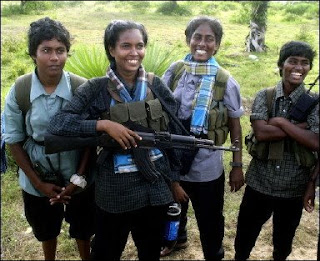Army ready to conquer the rebels' last bastion
The capture of Kilinochchi and Elephant Pass by the Sri Lankan army has understandably created great euphoria among many sections of the Sinhalese society in Sri Lanka. The fall of Kilinochchi on January 2, the de-facto capital of the Liberation Tigers of Tamil Eelam (LTTE) regime, was a devastating blow to the Tigers. Now their movements are confined to the jungles of Mullaithivu district. The army claimed on January 11 that its troops were making their way across the Mullathivu forests, the last bastion of the LTTE.
to the jungles of Mullaithivu district. The army claimed on January 11 that its troops were making their way across the Mullathivu forests, the last bastion of the LTTE.
Earlier, the LTTE had total control of the northern and eastern provinces. However, after its military power started declining progressively after the Karuna, the former eastern commander of LTTE split with Prabhakaran in 2004, it has been losing much territory. It lost Kilinochchi in 1996 after a fierce battle, but the town was regained two years later through a military operation called 'Unceasing Waves-2'. Hence, though the army’s present victories have weakened the Tigers’ capacity to retaliate, it has not struck the death knell for the LTTE. Some prominent Tamil leaders of Sri Lanka, like TULF leader V Anandasangaree, call LTTE the greatest obstacle in the country’s path to achieve durable peace and a political solution. But critics believe the greatest obstacle to be the government’s failure to initiate any serious constitutional reforms that can satisfy the minority community’s demands for equality and regional autonomy.
Prof Jayadeva Uyangoda, a prominent political scientist and constitutional expert of Sri Lanka, told TSI: “Military defeat of the LTTE will certainly weaken the bargaining capacity of all minorities for political equality and for sharing state power. But the Tamils aligned with the Sinhalese political establishment are likely to accept a state of inequality for the minorities in a post-LTTE scenario. They think that LTTE is the main obstacle to negotiate Tamil rights with the Sinhalese political leadership. For them, it is a legitimate trade off.”....Continue
The capture of Kilinochchi and Elephant Pass by the Sri Lankan army has understandably created great euphoria among many sections of the Sinhalese society in Sri Lanka. The fall of Kilinochchi on January 2, the de-facto capital of the Liberation Tigers of Tamil Eelam (LTTE) regime, was a devastating blow to the Tigers. Now their movements are confined
 to the jungles of Mullaithivu district. The army claimed on January 11 that its troops were making their way across the Mullathivu forests, the last bastion of the LTTE.
to the jungles of Mullaithivu district. The army claimed on January 11 that its troops were making their way across the Mullathivu forests, the last bastion of the LTTE.Earlier, the LTTE had total control of the northern and eastern provinces. However, after its military power started declining progressively after the Karuna, the former eastern commander of LTTE split with Prabhakaran in 2004, it has been losing much territory. It lost Kilinochchi in 1996 after a fierce battle, but the town was regained two years later through a military operation called 'Unceasing Waves-2'. Hence, though the army’s present victories have weakened the Tigers’ capacity to retaliate, it has not struck the death knell for the LTTE. Some prominent Tamil leaders of Sri Lanka, like TULF leader V Anandasangaree, call LTTE the greatest obstacle in the country’s path to achieve durable peace and a political solution. But critics believe the greatest obstacle to be the government’s failure to initiate any serious constitutional reforms that can satisfy the minority community’s demands for equality and regional autonomy.
Prof Jayadeva Uyangoda, a prominent political scientist and constitutional expert of Sri Lanka, told TSI: “Military defeat of the LTTE will certainly weaken the bargaining capacity of all minorities for political equality and for sharing state power. But the Tamils aligned with the Sinhalese political establishment are likely to accept a state of inequality for the minorities in a post-LTTE scenario. They think that LTTE is the main obstacle to negotiate Tamil rights with the Sinhalese political leadership. For them, it is a legitimate trade off.”....Continue